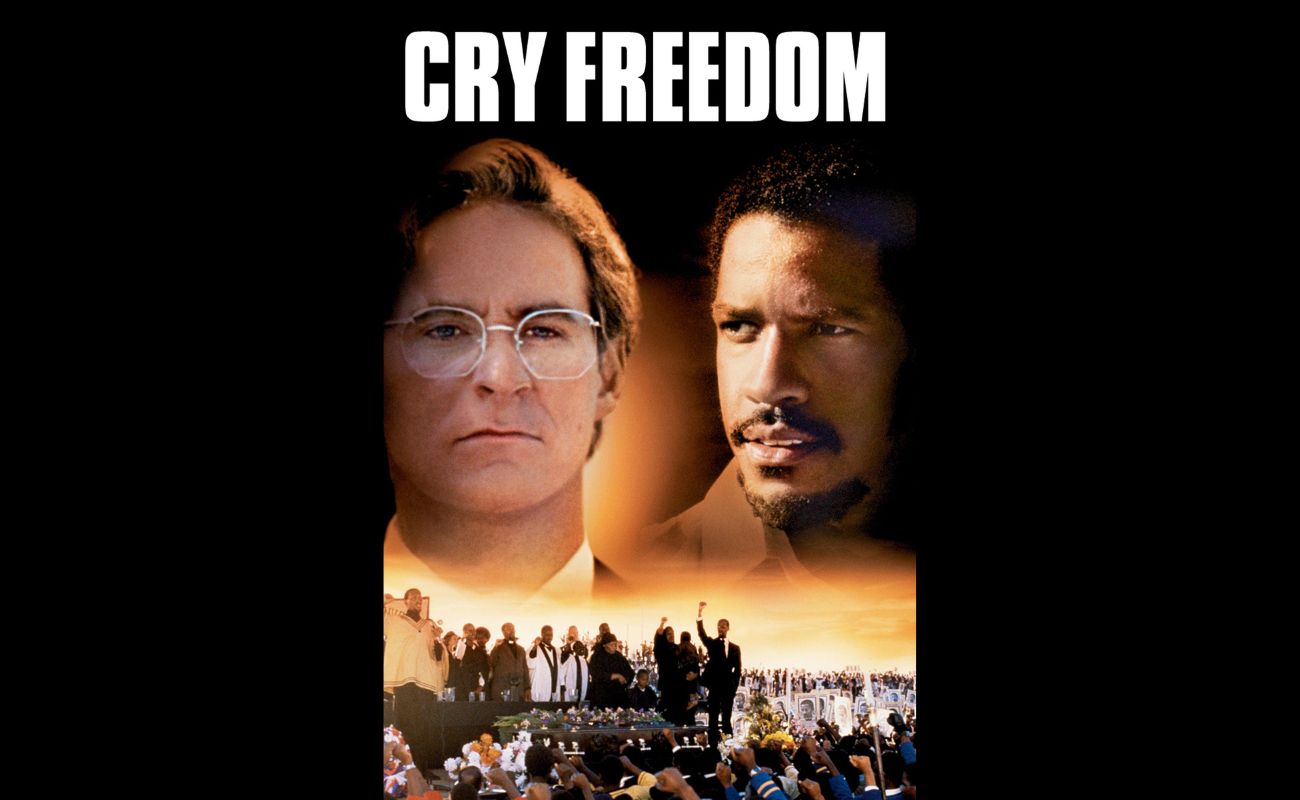
Cry Freedom is a powerful and thought-provoking film that explores important themes of human rights, apartheid, and the fight for freedom. Released in 1987 and directed by Richard Attenborough, the movie is based on the true story of South African journalist Donald Woods and his friendship with activist Steve Biko.
Set in the turbulent era of apartheid South Africa, Cry Freedom delves into the oppressive regime and the brave individuals who dared to challenge it. The film not only sheds light on the struggles faced by black South Africans, but also highlights the importance of journalism in exposing injustice.
With its captivating performances by Denzel Washington and Kevin Kline, Cry Freedom manages to strike a balance between heart-wrenching drama and gripping suspense. Through its emotionally charged narrative, the film immerses viewers in a world of oppression, resilience, and the unwavering pursuit of justice.
Key Takeaways:
- “Cry Freedom” is a powerful movie that sheds light on the struggles of apartheid in South Africa, featuring strong performances and a compelling narrative that continues to inspire social activism today.
- The film showcases the resilience of individuals in the face of oppression, highlighting the importance of standing together and fighting for justice, making it a timeless and impactful piece of cinema.
Cry Freedom was released in 1987.
The film made its debut in theaters on November 6, 1987, captivating audiences with its compelling narrative and emotional depth.
Richard Attenborough served as both the director and producer of the film.
Attenborough not only helmed the movie but also took on the responsibility of producing it, showcasing his talents both behind and in front of the camera.
Denzel Washington portrayed Steve Biko in a critically acclaimed performance.
Washington’s portrayal of the charismatic anti-apartheid activist was widely praised and earned him an Academy Award nomination for Best Supporting Actor.
Kevin Kline played the role of Donald Woods.
Kline excelled in the role of the courageous journalist who risked everything to expose the brutality of the apartheid system.
The movie is based on Donald Woods’ book, “Biko.”
Woods wrote a biography about his friend and colleague Steve Biko, which served as the inspiration for the film’s screenplay.
Cry Freedom was shot on location in Zimbabwe.
The film’s production took place in various locations in Zimbabwe, which stood in for both South Africa and the United Kingdom.
It was nominated for several Academy Awards.
Cry Freedom received five Oscar nominations, including Best Actor, Best Original Score, Best Original Song, Best Editing, and Best Supporting Actor.
The movie includes archival footage of the real Steve Biko.
To give the film an authentic touch, actual footage of Steve Biko was incorporated, allowing audiences to glimpse the real-life inspiration behind the character.
The film features an original score by George Fenton.
Fenton’s haunting and evocative music perfectly complements the emotional depth of the film, enhancing its impact on the audience.
Cry Freedom highlights the violent nature of apartheid.
The movie vividly portrays the brutality and oppression of the apartheid regime, shedding light on the struggles faced by Black South Africans during that time.
The film addresses press censorship under apartheid.
Donald Woods’ battle against censorship and his determination to expose the truth is a significant theme throughout the movie.
Cry Freedom received positive reviews from critics.
The film was well-received by critics, who praised its performances, storytelling, and its portrayal of social injustice.
The movie was banned in South Africa.
Due to its depiction of the apartheid regime, Cry Freedom was banned in South Africa during the time of its release.
The film inspired a generation of activists.
Cry Freedom had a profound impact on viewers, inspiring many to take action against apartheid and fight for social justice.
It delves into the friendship between Donald Woods and Steve Biko.
The movie explores the deep bond forged between the two men, highlighting the impact they had on each other’s lives.
The movie’s title references the struggle for freedom.
“Cry Freedom” captures the essence of the film’s overarching theme of fighting for liberation and justice.
Cry Freedom was a box office success.
Despite its heavy subject matter, the film resonated with audiences and performed well at the box office, further spreading its important message.
The movie showcases the strength of the human spirit.
Cry Freedom depicts the resilience and determination of individuals who refuse to be silenced by an oppressive regime.
It serves as a powerful historical document.
Cry Freedom provides a valuable insight into the struggles and events that shaped the anti-apartheid movement in South Africa.
The film received accolades for its costumes and production design.
The attention to detail in the film’s costumes and set design earned the praise of critics and industry professionals alike.
Cry Freedom draws attention to the Black Consciousness Movement.
Steve Biko’s role as a leading figure in the Black Consciousness Movement is explored in depth, shedding light on this significant aspect of South African history.
The movie portrays the power of journalism.
Donald Woods’ commitment to truth and his unwavering dedication to exposing injustice shows the impact that journalism can have in effecting change.
Cry Freedom raises awareness about apartheid internationally.
The film played a crucial role in informing global audiences about the oppression and struggles faced by Black South Africans during apartheid.
The movie’s release coincided with significant political events.
Cry Freedom premiered at a time when international pressure against apartheid was mounting, further amplifying its impact.
The film emphasizes the importance of storytelling.
Through the lens of Donald Woods’ narrative, Cry Freedom underscores the power of storytelling as a tool for bringing hidden truths to light.
Cry Freedom received numerous nominations and awards.
In addition to its Academy Award nominations, the film was recognized by various other award ceremonies, further validating its critical acclaim.
The movie highlights the courage of ordinary individuals.
Cry Freedom highlights the extraordinary bravery displayed by ordinary people who stood up against an oppressive regime.
It showcases the human cost of political activism.
The film explores the personal sacrifices made by Steve Biko, Donald Woods, and others involved in the struggle against apartheid.
Cry Freedom features a diverse ensemble cast.
The movie brings together actors from different backgrounds, further emphasizing the universal message of the film.
The film’s release sparked conversations about apartheid.
Cry Freedom ignited discussions and raised awareness about apartheid, inspiring dialogue about racial equality and social justice.
It depicts the realities of life under apartheid.
Cry Freedom portrays the day-to-day challenges faced by Black South Africans, shedding light on the systemic discrimination they endured.
The movie captures the spirit of resilience.
Despite the hardships they faced, the characters in Cry Freedom display an unwavering resilience in their quest for justice.
Cry Freedom had a lasting impact on South African cinema.
The film played a significant role in shaping the future of South African cinema, paving the way for more stories centered around apartheid and its aftermath.
The film’s screenplay was written by John Briley.
Briley’s script expertly weaves together the personal stories of Donald Woods and Steve Biko within the larger context of apartheid.
Cry Freedom sheds light on state-sanctioned violence.
The film exposes the atrocities committed by the South African government in its attempt to suppress dissent and maintain control.
It depicts the impact of Biko’s death on his community.
The movie explores the profound impact of Steve Biko’s death on the Black community and the renewed determination to fight against apartheid.
Cry Freedom showcases the power of unity.
The film highlights the importance of standing together in the face of adversity, showcasing the strength of collective action.
It emphasizes the importance of education and knowledge.
Steve Biko’s belief in the power of education resonates throughout the film, underscoring the role knowledge plays in liberating the mind.
The movie portrays the complexity of racial dynamics in South Africa.
Cry Freedom delves into the intricacies of race relations in South Africa, exploring the prejudices and stereotypes that perpetuated the apartheid system.
It showcases the hope for change and a better future.
Despite the darkness of the apartheid era, Cry Freedom conveys a message of hope and a belief in the possibility of a more just society.
The film’s cinematography captures the beauty of South Africa.
Through stunning visuals, Cry Freedom showcases the natural landscapes of South Africa, highlighting the country’s rich and diverse culture.
It features powerful and thought-provoking dialogue.
The film’s script is filled with poignant and memorable lines that resonate long after the movie ends, encouraging deeper reflection on its themes.
Cry Freedom pays homage to the real-life heroes behind the story.
The movie honors the bravery and resilience of individuals like Steve Biko and Donald Woods, who fought tirelessly against injustice.
It confronts the audience with uncomfortable truths.
Cry Freedom does not shy away from the harsh realities of apartheid, forcing viewers to confront the brutality and discrimination experienced by Black South Africans.
The movie serves as an educational tool.
Cry Freedom provides a valuable educational resource, allowing viewers to gain a deeper understanding of the history of apartheid and its impact on South Africa.
It highlights the role of international solidarity in the struggle against apartheid.
The film emphasizes the importance of global support and involvement in the fight against apartheid, showcasing the power of united action.
Cry Freedom continues to inspire social activism.
The powerful messages and themes of the film have transcended time, inspiring new generations to stand up against inequality and injustice.
The legacy of Cry Freedom lives on.
The film’s impact can still be felt today, reminding us of the importance of challenging oppression and fighting for a more equitable world.
These 48 facts about the movie Cry Freedom highlight its significance as a thought-provoking and impactful film that continues to resonate with audiences. From its compelling performances to its portrayal of South Africa’s dark past, Cry Freedom stands as a powerful testament to the enduring nature of the human spirit and the fight for justice and freedom.
Conclusion
In conclusion, the movie “Cry Freedom” is a powerful and impactful film that sheds light on the struggles faced during apartheid in South Africa. Through its compelling storyline, brilliant performances, and thought-provoking themes, the movie captivates audiences and encourages them to reflect on the importance of justice, freedom, and the fight against racial inequality. With its historical accuracy and emotional depth, “Cry Freedom” serves as a reminder of the resilience of individuals and the power of activism in the face of oppression. Whether you’re a fan of historical dramas, human rights advocacy, or simply crave a moving cinematic experience, “Cry Freedom” is definitely a must-watch film that will leave a lasting impression.
FAQs
Q: Is “Cry Freedom” based on a true story?
A: Yes, “Cry Freedom” is based on the true story of South African activist Steve Biko, as well as the experiences of journalist Donald Woods.
Q: Who directed “Cry Freedom”?
A: The movie was directed by Richard Attenborough, who is known for his work on notable films such as “Gandhi” and “Shadowlands.
Q: When was “Cry Freedom” released?
A: The film was released in 1987.
Q: Who starred in “Cry Freedom”?
A: The movie features Denzel Washington as Steve Biko and Kevin Kline as Donald Woods, along with a talented supporting cast.
Q: What is the main message of “Cry Freedom”?
A: The main message of the film is the importance of fighting against racial injustice and inequality and the power of individuals to effect change through activism and advocacy.
Was this page helpful?
Our commitment to delivering trustworthy and engaging content is at the heart of what we do. Each fact on our site is contributed by real users like you, bringing a wealth of diverse insights and information. To ensure the highest standards of accuracy and reliability, our dedicated editors meticulously review each submission. This process guarantees that the facts we share are not only fascinating but also credible. Trust in our commitment to quality and authenticity as you explore and learn with us.


